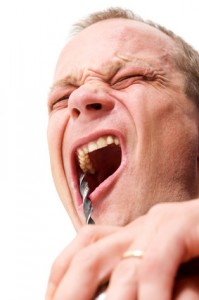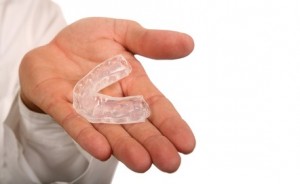 Okay, I understand getting to the dentist when you have an emergency can sometimes be hard. And, yes I realize that it’s awfully tempting to try and fix the problem yourself. But, there are just some things you should not do at home. This brings us to this weeks blog post. The WORST home remedies for dental problems.
Putting garlic against a sore tooth…. Besides making you smell bad, garlic is very potent and can irritate or burn soft tissues around the tooth causing even more pain and sensitivity.
Shaving down a sharp tooth with tools from around the house… Besides the fact that you are putting something that has seen more dirty surfaces than I’d care to mention directly into your mouth, you are putting yourself at risk for damaging the tooth more or slipping and causing damage to your cheeks and gums.
Using crazy glue to fix a broken natural tooth... Yes, I know people say the same stuff that’s in super glue is the same stuff used to seal battlefield wounds, and they’d be correct. However, the stuff used to seal battlefield wounds are made specifically to seal battlefield wounds. Using superglue to fix a tooth most likely will result in 1: You super gluing your finger to your lip, cheek, tooth or some variation of the aforementioned. Or 2: Pain from a tooth with a freshly injured dental nerve being assaulted by a brand of material that was not meant to see the inside of your mouth or to fix broken teeth. Trust me, its not pretty….
Whitening your teeth with lemon juice and baking soda… This one, although its gotten a lot of popularity throughout the years, is just not healthy for your teeth. Mixing an abrasive and an acid together and then scrubbing it on your teeth can cause abrasion to your gums while also removing and/or damaging the enamel on your teeth.
And lastly, searching through your medicine cabinet and finding a left over prescription from those wisdom teeth you (or someone you know) had extracted about ten years ago… Its not a mystery that taking old, expired or another persons prescription medications is a bad idea. Taking one or two remaining capsules of an antibiotic is not only ineffective, it can also help promote bacterial resistance to antibiotics. Also, taking prescription medications that were not prescribed to you can put you right in the middle of an adverse or even allergic reaction to a drug that no one knows you are taking. So if you are having a problem call your dentist or doctor first before resorting to whats left over in the medicine cabinet. Also, whenever you are prescribed medication once you have finished the prescription if there are any tablets remaining they should be disposed of.
So, I’m not saying there are not some things that you can do at home in a pinch to get you by until you can see your dentist. But, in an emergency situation, first and foremost, call your dentist and see when they can see you for an appointment and tell them your emergency. Your dentist will suggest the best way to get you comfortable and safely treated!]]>
Okay, I understand getting to the dentist when you have an emergency can sometimes be hard. And, yes I realize that it’s awfully tempting to try and fix the problem yourself. But, there are just some things you should not do at home. This brings us to this weeks blog post. The WORST home remedies for dental problems.
Putting garlic against a sore tooth…. Besides making you smell bad, garlic is very potent and can irritate or burn soft tissues around the tooth causing even more pain and sensitivity.
Shaving down a sharp tooth with tools from around the house… Besides the fact that you are putting something that has seen more dirty surfaces than I’d care to mention directly into your mouth, you are putting yourself at risk for damaging the tooth more or slipping and causing damage to your cheeks and gums.
Using crazy glue to fix a broken natural tooth... Yes, I know people say the same stuff that’s in super glue is the same stuff used to seal battlefield wounds, and they’d be correct. However, the stuff used to seal battlefield wounds are made specifically to seal battlefield wounds. Using superglue to fix a tooth most likely will result in 1: You super gluing your finger to your lip, cheek, tooth or some variation of the aforementioned. Or 2: Pain from a tooth with a freshly injured dental nerve being assaulted by a brand of material that was not meant to see the inside of your mouth or to fix broken teeth. Trust me, its not pretty….
Whitening your teeth with lemon juice and baking soda… This one, although its gotten a lot of popularity throughout the years, is just not healthy for your teeth. Mixing an abrasive and an acid together and then scrubbing it on your teeth can cause abrasion to your gums while also removing and/or damaging the enamel on your teeth.
And lastly, searching through your medicine cabinet and finding a left over prescription from those wisdom teeth you (or someone you know) had extracted about ten years ago… Its not a mystery that taking old, expired or another persons prescription medications is a bad idea. Taking one or two remaining capsules of an antibiotic is not only ineffective, it can also help promote bacterial resistance to antibiotics. Also, taking prescription medications that were not prescribed to you can put you right in the middle of an adverse or even allergic reaction to a drug that no one knows you are taking. So if you are having a problem call your dentist or doctor first before resorting to whats left over in the medicine cabinet. Also, whenever you are prescribed medication once you have finished the prescription if there are any tablets remaining they should be disposed of.
So, I’m not saying there are not some things that you can do at home in a pinch to get you by until you can see your dentist. But, in an emergency situation, first and foremost, call your dentist and see when they can see you for an appointment and tell them your emergency. Your dentist will suggest the best way to get you comfortable and safely treated!]]>
 Bruxism can occur during the day or night but for most people occurs at night. This habit can cause significant damage to the teeth and cause discomfort to the structures that hold your jaw and TMJ in place. Although many speculate what causes people to clench and grind often times there is no clear cause for it and may resolve on its own.
Bruxism can occur during the day or night but for most people occurs at night. This habit can cause significant damage to the teeth and cause discomfort to the structures that hold your jaw and TMJ in place. Although many speculate what causes people to clench and grind often times there is no clear cause for it and may resolve on its own.


 1.
1. 